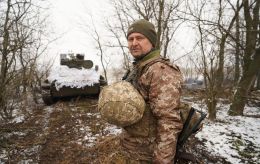Munich Security Conference starts today: Main topics and program
 Photo: President of Ukraine Volodymyr Zelenskyy at the Munich conference (Getty Images)
Photo: President of Ukraine Volodymyr Zelenskyy at the Munich conference (Getty Images)
The Munich Security Conference 2025 promises an eventful program with the participation of many world leaders. On February 14-16, discussions on global security issues will occur, with the Ukraine war as a key topic. President Volodymyr Zelenskyy will deliver a speech and meet with the US delegation.
Read the main points about the Munich Security Conference 2025 in the RBC-Ukraine article below.
Contents
- Conference program
- Participants
- Ukraine on agenda
- Multipolarization: topic of MSC 2025 report
- Ukraine-US negotiations in Munich
Conference program
The Munich Security Conference (MSC) annually brings together heads of state, government, and organizations to discuss current international issues.
The forum will be opened by the conference chairman Christoph Heusgen at the Bayerischer Hof Hotel on February 14 at 1:30 p.m. German President Frank-Walter Steinmeier will deliver the opening speech.
The first day's program focuses on challenges to global security, including the future of global governance, global financial architecture, democratic resilience, climate security, nuclear security, hybrid threats, and the future of AI.
On February 15, a debate will be held on the state of the international order, regional conflicts, and crises, from the future of the transatlantic partnership to Ukraine. Participants will discuss the situation in Sudan, Haiti, Venezuela, Afghanistan, Georgia, and the Middle East.
On February 16, the participants will discuss Europe's role in the world, including EU enlargement and European competitiveness.
Participants
Over 800 participants from 110 countries are expected to attend the Munich Conference. The forum will be attended by more than 50 leaders of states and governments, as well as about 150 ministers and heads of international organizations.
Volodymyr Zelenskyy will head the Ukrainian delegation to the Munich Conference and deliver a speech as part of the main program of the forum.
The United States will be represented at the MSC by the new Vice President J.D. Vance, Secretary of State Marco Rubio, and the US President's Special Envoy for Ukraine and Russia Keith Kellogg.
Germany will be represented at the conference by current Chancellor Olaf Scholz, CDU leader Friedrich Merz, Green Party leader Robert Habeck, and Free Democratic Party leader Christian Lindner. All of them are candidates in the Bundestag elections to be held in a week. German Defense Minister Boris Pistorius is also expected to attend.
NATO Secretary General Mark Rutte, European Commission President Ursula von der Leyen, European Parliament President Roberta Mecola, European Council President Antonio Costa, EU High Representative for Foreign Affairs and Security Policy Kaja Kallas, and European Commissioner for Defense Andrius Kubilius will attend the MSC.
Ukraine on agenda
Russia's war in Ukraine will be at the center of attention at the Munich Security Conference.
According to the organizers, Russia's full-scale invasion began a few days after the MSC in 2022 and continues to this day, so the forum will discuss how to establish and maintain a ceasefire in Ukraine.
Just days after #MSC2022, Russia launched its war of aggression against #Ukraine. Almost three years later, it still continues. European security will be on the agenda for #MSC2025. pic.twitter.com/8IyUZ992rs
— Munich Security Conference (@MunSecConf) February 12, 2025
The Office of the President of Ukraine has announced that at MSC 2025, Volodymyr Zelenskyy will present Ukraine's position on ending the war and his views on how to achieve a lasting and durable peace.
According to Andrii Yermak, the head of the Office of the President, who will also attend the forum, in Munich hopes to discuss what security guarantees can be applied to prevent Russia's repeated aggression.
In addition, a US delegation will attend the MSC to hold discussions with allies on possible ways to reach a peaceful settlement.
Secretary of State Marco Rubio, who will participate in the conference on behalf of the United States, said that ending Russia's war against Ukraine will be a key issue in Munich, as it is in everyone's interest.
According to the NYT, one of the main topics may be the discussion of sending European troops to Ukraine in the event of a peace agreement to monitor the ceasefire and help deter Russia from a possible re-invasion.
The MSC format does not provide for the adoption of final communiqués. However, the chairman of the conference, Christoph Heusgen, expressed hope that this year's forum will be able to identify steps to achieve peace in Ukraine.
Multipolarization: topic of MSC 2025 report
Every year, the MSC publishes a report analyzing current events in the field of global security policy. Its contents are discussed at the conference events.
The 2025 report is titled Multipolarization and focuses on the problem of polarization both between and within many states, which hinders common approaches to global crises and threats. In particular, the new US administration, the war in Ukraine, and Russia are discussed.
The report's summary states that the world is becoming increasingly multipolar, although the extent of this multipolarity is still being debated. Power is being distributed among more players, which increases ideological differences and complicates international cooperation.
India, Brazil, and South Africa are seeking greater influence, China is the most active supporter of multipolarization, and Russia has made the most efforts to change the existing international order. At the same time, the United States is shifting its focus from Europe to competition with China.
The authors of the report write that, as a result, the United States may abandon its historic role as a guarantor of European security, which could have significant consequences for Ukraine. They also mention that US foreign policy in the coming years is likely to be shaped by Washington's bipolar competition with Beijing. However, they suggest that this could accelerate the multipolarization of the international system.
Russia's war against Ukraine and the rise of nationalist populism in many European societies, among other things, threaten key elements of the EU's liberal vision. The re-election of Donald Trump may exacerbate these challenges and reignite the debate on whether the EU should become an autonomous pole in international politics.
The document states that Russia is undermining efforts to stabilize the international order. However, it is facing growing economic problems and the consequences of imperial overstretch. It also mentions that whether the country will be able to realize its vision of multipolar spheres of influence will depend on the opposition of others.
Ukraine-US negotiations in Munich
During the Munich Security Conference 2025, the Ukrainian President will meet with representatives of the United States.
According to Zelenskyy's press secretary, Serhii Nikiforov, the President of Ukraine and Trump's special envoy for Ukraine and Russia, Keith Kellogg, are expected to meet.
The Ukrainian leader will also meet with US Vice President J.D. Vance on the sidelines of MSC 2025.
Before the conference, several Western media outlets wrote that Kellogg would present a peace plan to end the war in Ukraine in Munich.
But the US President's envoy denied this information. He said that at the forum he would have extensive discussions with allies, the content of which he would report to Donald Trump to move forward in the process of peaceful settlement.
In addition to the Munich conference, Keith Kellogg will visit Ukraine and several other European countries. The American official's trip will last from February 13 to 20.
According to the US State Department's website, Kellogg is committed to tough diplomacy and will speak with allies and partners across Europe who stand ready to work with the United States to end Russia's war against Ukraine and restore stability to Europe.
Sources: MSC portal, US Department of State, New York Times, head of the Ukrainian President's Andrii Yermak, the press secretary of the President of Ukraine Serhii Nikiforov, and Keith Kellogg's.

